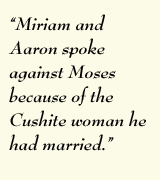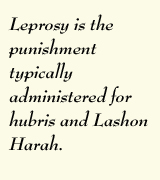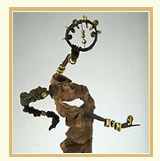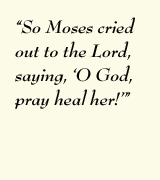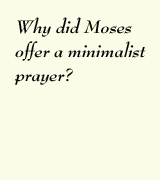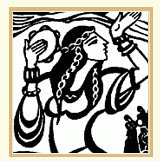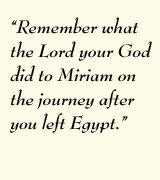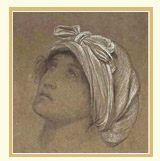A Prayer For Miriam
In a perplexing vignette recorded in Numbers chapter 12, we learn of a punishment dealt to Miriam for maligning her brother Moses.
Miriam and Aaron spoke against Moses because of the Cushite woman he had married: “He had married a Cushite woman!” They said, “Has the Lord spoken through Moses? Has He not spoken through us as well?
The Lord heard it.
(Num. 12: 1-2)
Miriam’s conversation with Aaron appears to revolve around two key issues. She begins by reporting the scandalous fact that Moses married a Cushite woman! The exact nature of her allegation is shady at best, but the statement that follows, deals with a second issue that may explain the first. “Has the Lord spoken through Moses? Has He not spoken through us as well?” Miriam and presumably, Aaron undermined Moses because they themselves felt undermined. The words are interpreted by God Himself as a rebellion against Moses. He vindicates Moses in a glorious testimonial, describing his unprecedented humility and prophetic prowess:
Now Moses was a very humble man, more so than any other man on earth… When a prophet of the Lord arises among you, I make Myself known to him in a vision, I speak with him in a dream. Not so with My servant Moses; he instrusted throughout My household. With him I speak mouth to mouth, plainly and not in riddles, and he beholds the likeness of the Lord. How then did you not shrink from speaking against My servant Moses! Still incensed with them, the Lord departed.
(Num. 12:3:-9)
Enraged by the effrontery, God strikes Miriam with leprosy.
As the cloud withdrew from the Tent, there was Miriam stricken with snow-white scales! When Aaron turned toward Miriam, he saw that she was stricken with scales.
(Num. 12:10)
Both the choice of punishment and the outcome are singularly appropriate. Leprosy is the punishment typically administered for hubris and lashon harah (gossip). The white scales that covered Miriam’s body, starkly contrast with the black skin of the Cushite woman she maligned. Moreover, since Miriam challenged Moses’ authority and attacked his special closeness with God, she was healed only when Moses employed the special relationship he had with the Almighty, on her behalf. Aaron, devastated by their sister’s state, turns to Moses imploring him to intercede on her behalf. Moses offers a prayer and is answered:
And Aaron said to Moses,”O my lord, account not to us the sin which we committed in our folly. Let her not be as one dead, who emerges from his mother’s womb with half his flesh eaten away.” So Moses cried out to the Lord, saying, “O God, pray heal her!” But the Lord said to Moses, “If her father spat in her face, would she not bear her shame for seven days? Let her be shut out of camp for seven days, and then let her be readmitted’.
(Num.12:11-14)
The Rabbis [1]Sifre Behaalotcha 47 explain that this is one of the four instances when Moses prayed and requested of God to inform him of the outcome of his prayer. The first time was at the beginning of his career. He turned to God forlorn and said, “Behold the Children of Israel have not hearkened unto me how then shall Pharaoh hearken to me?” (Exod. 6:12). Once he pleaded with God to send a reasonable replacement for him to lead the people (Num.27:15-18). Once he asked permission to enter the Land (Deut. 323-26) and on this occasion he asked for Miriam’s recovery. Notably, in this midrashic exposition, three out of Moses’ four prayers were answered. God reassured Moses that He would handle Pharaoh, He would appoint Joshua, and Miriam would be cured after seven days. Moses’ prayers for others were answered in full. Sadly, his own request to enter the Holy Land was turned down.
Moses prayer for Miriam was short and to the point: ‘El na Refa na Lah’ –
“O God, pray heal her!” In fact, the Rabbis call this the shortest of all prayers.[2]Berachot 34a Why did Moses offer a minimalistic prayer? Rashi supplies two explanations.
In order that Israel should not say: His sister is in trouble and he stands and offers long prayers. Another explanation is He did not pray at length so that Israel should not say: On behalf of his sister he prays long, but on our behalf he would offer no long prayer.
(Rashi, Num. 12:13)
Though short, Moses’ prayer was answered. [3]Midrash Hachadash
אמר ר’ תנחומא יש תפילה שהיא באה לשתי שנים ויש למ’ יום ויש תפילה לאחד ועשרים יום ויש תפילה לשעה תפלתו בשביל מרים שנא’ קל נא רפא נא לה
This biblical account of Miriam is enigmatic, but nonetheless significant. In addition to providing a classic illustration of the healing power of prayer,[4]Torah Shelema 136 Devora Steinmetz [5]“Portrait of Miriam in Rabbinic Midrash” p. 55 notes that it presents a non-synthetic view of Miriam the prophetess. She is portrayed biblically both in positive and negative lights. This makes her a particularly approachable and accessible character and allows us to learn much from her actions. The Torah, in fact, immortalizes this particular event with the following command: “Remember what the Lord your God did to Miriam on the journey after you left Egypt”. (Deut. 24:9)
What is it we are to remember? Let us consider several interpretive perspectives.
Rabbi Moses ben Nahman (Ramban) lists this verse as a positive biblical ordinance; extrapolating from Miriam’s experience to desist from gossiping:[6] Ramban Sefer Hamitzvot mitzvah 7: mitzvoth sheshachach haRav cf. his Commentary on the Pentateuch Deut. 24:9
We have been commanded to remember with our mouths and take to heart, that Which God, may He be exalted, did to Miriam when she spoke against her brother, even though she was a prophetess. This is in order that we distance ourselves from gossip (lashon harah) so we should not be like those about whom it says: ‘You are busy maligning your brother defaming the son of your mother’. (Ps 50:20)
In his biblical commentary, Rabbenu Bachya ben Asher explains that the commandment is all the more powerful since the case in point involved Miriam the prophetess:
If Miriam the zeddeket (righteous one) the prophetess, who spoke only of her brother, and was older than him, and raised him and gave her life for him in the episode on the banks of the Nile and did not malign him to his face received such a severe punishment for speaking (lashon harah) and was not given any credit or reprieve from this punishment. Moreover, the statement wasn’t lashon harah proper. She equated him with other prophets. Therefore, any ordinary person who actually gossips speaks lashon harah about great men or women to their faces and embarrasses them shall receive a double measure of punishment. The Torah forbade associating with fools and derelicts who speak foolishness as it says “Foolish utterance comes with much speech (Eccl.5:2) and from foolish utterance he will come to speak lashon harah about people. And from speaking lashon harah about common people he with slander great people, as it says “Let lying lips be stilled that speak haughtily against the righteous with arrogance and contempt. (Ps. 31:19) By doing this once will come to insult and degrade the messengers of God and berate the prophets, as it says, “But they mocked the messengers of God and disdained His words and taunted His prophets. (IIChron.36:16) and by doing this one will speak evil of God as it says “They set their mouths against heaven and their tongues range over the earth. (Ps. 73:9).
(Commentary of Rabbenu Bachya, Deut. 24:9)
In his commentary of the Siddur (Olat HaRaayah), Rabbi Abraham Isaac HaCohen Kook shifts the emphasis:
Remember what the Lord your God did to Miriam on the journey after you left Egypt. It would seem that contained within this principle is also to always recall that no other prophet approaches the level of Moses Our Master of blessed memory. When Miriam likened her status to that of the other prophets she was punished – comparing herself to Moses. This requires noting since it builds a solid wall barricade around the Torah of God and its eternal quality since God may He be exalted commanded that NO prophet is on Moses’ level. Therefore, if there arises a prophet who heaven forfend negates abrogates one of his (Moses’) words (even though we are told that there never again arose a prophet like Moses) in any event a constant reminder was added.
(Olat HaRaayah I, p. 334)
The story of Miriam’s sin and punishment ends on a heart-warming note:
So Miriam was shut out of camp seven days; and the people did not march on until Miriam was readmitted.
(Num 12:1-15)
The Rabbis embellish the verse by explaining:
As a person measures so others measure them. Miriam waited for her brother Moses one hour as it says, “And his sister stood watch from a distance (Exod.2:4), therefore the Shechinah, the ark, the priests, the Levites, the clouds of glory and all of Israel waited for her as it says, ‘the people did not march on until Miriam was readmitted.’
(Sifre Behaalotcha 48)
Although, the Torah stipulates that we remember Miriam’s misdemeanor and not repeat her mistake; our memories take us much further. We remember the loyalty and respect the people paid her on that occasion. We remember her long-range vision and the unforgettable song she sang at the sea. We will never forget her outstanding leadership ability and her remarkable charisma. The picture of her first dance steps may have even inspired the prophet Jeremiah to use Miriam as a model for the joy which will accompany the long awaited redemption:
O Maiden Israel!
Again you shall take up your timbrels
And go forth to the rhythm of the dancers.
(Jeremiah 31; 4)
In the fullness of time, all Israel shall follow Miriam’s rhythms, dancing to the beat of the timbrels and singing the song of deliverance.
